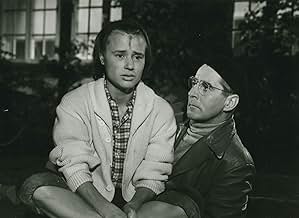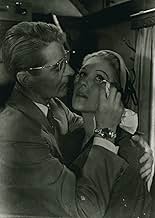IMDb-BEWERTUNG
7,0/10
3955
IHRE BEWERTUNG
Füge eine Handlung in deiner Sprache hinzuAfter a 15-year marriage, the spouses are going to divorce, but suddenly find out that their feelings have not vanished yet.After a 15-year marriage, the spouses are going to divorce, but suddenly find out that their feelings have not vanished yet.After a 15-year marriage, the spouses are going to divorce, but suddenly find out that their feelings have not vanished yet.
Birgitte Reimer
- Lise
- (as Birgitte Reimers)
Georg Adelly
- Bartender
- (Nicht genannt)
Ingmar Bergman
- Narrator
- (Nicht genannt)
- …
Julie Bernby
- Guest at Wedding
- (Nicht genannt)
Henning Blanck
- Guest at Wedding
- (Nicht genannt)
Tor Borong
- Gentleman
- (Nicht genannt)
Yvonne Brosset
- Dancer in Bar
- (Nicht genannt)
Olle Ekbladh
- Guest at Wedding
- (Nicht genannt)
Empfohlene Bewertungen
Bergman and comedy don't quite go together. Some of his comedies are so naff you almost wince. This film has the odd naff moment - the last 30 seconds being the nadir, but on the whole this is a charming (rather than funny) piece, enjoyable throughout. Bergman casts several of his usual suspects who perform well. There is a great scene on the train between David, Marianne and an uncouth salesman which will stick in the memory. Some of the marriage material is typical, cynical Bergman, but this is Bergman in a light rather than dark mood.
This film has its moments and is worth the 90-odd minutes. Not one of his classics and not the place to start if you want to fall for Bergman.
This film has its moments and is worth the 90-odd minutes. Not one of his classics and not the place to start if you want to fall for Bergman.
See the lighter side of Bergman in this movie. Marital difficulties and challenges are explored. Even though there's some food for thought, the movie stays on the surface and doesn't go into lenghty analysis. Reminded me about some of Eric Rohmer's films, but without the fine details. Not to worry though, Bergman's lesson in love is still worth watching. It's charming, but mostly funny. It makes for an enjoyable 90 minutes. Great job by the lead actors Gunnar Björnstrand, Eva Dahlbeck and the beautiful Yvonne Lombard. But I would agree with others that the last 30 seconds of the film are questionable.
Seen at home, in Toronto, on January 7th, 2006.
82/100 (***)
Seen at home, in Toronto, on January 7th, 2006.
82/100 (***)
"A Lesson in Love" was, at least to some extent, an exception in Ingmar Bergman's production which reached its breakthrough one year later with "Smiles of a Summer Night". Then continued with such masterpieces as "The Seventh Seal" and "Wild Strawberries". However, even if "A Lesson in Love" wasn't the film which defined Bergman, it is still very enjoyable, witty and intriguing. In a sense, it meant a follow-up for "Summer with Monika" which gave a kick-start for the sexual liberalization of Scandinavia. In the very beginning, "A Lesson in Love" reveals the essence of its nature, which is veritably ironic: "A comedy for grown-ups. This could just as well be a tragedy. Its protagonist isn't the man nor the women but the unpredictable life itself."
The story centers around a couple who have been married for 15 years. Both have had their affairs but now -- through memories of past and days spent together -- it's time for a possible reconciliation during a train travel where they 'accidentally' come across with each other. Gunnar Björnstrand is fabulous with his sarcastic charm as the man who has lost his faith in enduring, eternal love. In addition, Harriet Andersson plays a fantastic supporting character as the man's charming yet rebellious daughter.
It is no wonder that Bergman chose train as the main milieu for this film which is, for most parts, built on numerous flashbacks, memories and dreams. For isn't train really the milieu which captures the core of our logic -- of our subconsciousness? During the train travel, all that is essential is performed in front of our eyes: the unhappiness of the protagonist's marriage is, paradoxically, due to its harmonic welfare. It lacks on something very substantial, something irrational. It is as if the sterility of bourgeois life had suffocated all genuine emotions which often are the factors that make marriage lively and vivid. That is to say, similar thoughts prevail the mood of this film which were due to characterize all of Bergman's subsequent films.
"A Lesson in Love" is not necessarily your regular comedy of the 1950's but, to my mind, it has several laugh-out-loud moments. In this film, Bergman is at his best striking a few blows at the patriarchal, while depicting marriage as a real purgatory. In fact, Bergman's comedy is so black that, at times, laughter is about to get stuck in one's throat. Such serious matters he makes fun of. The whole ridiculous absurdity of the society, which is built on the unjust institutions of marriage, religion and fatherland, culminates in the dinner party scene where a prayer is rendered, a thigh is flashed and a fight breaks out. Such anarchist criticism bears a striking resemblance to the films of Luis Buñuel who also operated poignant analyses of the western society. By conducting a rather sensual study on sexuality and the contradiction of eroticism and love, "A Lesson in Love" even manages to gather some feminist features, making the film extremely interesting in its historical context.
Although the film includes a few expressionistic images and discusses some existential themes, which have made Bergman so famous, it is still a very unusual work for the director. It is really the thesis of the film which makes it recognizable. For, in the end, the lesson of this session, both gloomy and jolly, isn't left ambiguous: romantic love is impossible unless if structured on the act of deception and severe self-betrayal.
The story centers around a couple who have been married for 15 years. Both have had their affairs but now -- through memories of past and days spent together -- it's time for a possible reconciliation during a train travel where they 'accidentally' come across with each other. Gunnar Björnstrand is fabulous with his sarcastic charm as the man who has lost his faith in enduring, eternal love. In addition, Harriet Andersson plays a fantastic supporting character as the man's charming yet rebellious daughter.
It is no wonder that Bergman chose train as the main milieu for this film which is, for most parts, built on numerous flashbacks, memories and dreams. For isn't train really the milieu which captures the core of our logic -- of our subconsciousness? During the train travel, all that is essential is performed in front of our eyes: the unhappiness of the protagonist's marriage is, paradoxically, due to its harmonic welfare. It lacks on something very substantial, something irrational. It is as if the sterility of bourgeois life had suffocated all genuine emotions which often are the factors that make marriage lively and vivid. That is to say, similar thoughts prevail the mood of this film which were due to characterize all of Bergman's subsequent films.
"A Lesson in Love" is not necessarily your regular comedy of the 1950's but, to my mind, it has several laugh-out-loud moments. In this film, Bergman is at his best striking a few blows at the patriarchal, while depicting marriage as a real purgatory. In fact, Bergman's comedy is so black that, at times, laughter is about to get stuck in one's throat. Such serious matters he makes fun of. The whole ridiculous absurdity of the society, which is built on the unjust institutions of marriage, religion and fatherland, culminates in the dinner party scene where a prayer is rendered, a thigh is flashed and a fight breaks out. Such anarchist criticism bears a striking resemblance to the films of Luis Buñuel who also operated poignant analyses of the western society. By conducting a rather sensual study on sexuality and the contradiction of eroticism and love, "A Lesson in Love" even manages to gather some feminist features, making the film extremely interesting in its historical context.
Although the film includes a few expressionistic images and discusses some existential themes, which have made Bergman so famous, it is still a very unusual work for the director. It is really the thesis of the film which makes it recognizable. For, in the end, the lesson of this session, both gloomy and jolly, isn't left ambiguous: romantic love is impossible unless if structured on the act of deception and severe self-betrayal.
Bergman is a sublime comedy director and writer. This fact becomes apparent in "En lektion I kärlek", where the comic elements range from pure slapstick to deep, yet very emotional scenes. This movie is paves the way for Bergman's later comedies "Sommarnattens leende" and "Kvinnodröm", all of them starring Gunnar Björnstrand as well as Eva Dahlbeck. This is an excellent movie with which to start your Bergman experience, acutely portraying emotional troubles of the young as well as the old. The cinematography by Martin Bodin is astounding, for instance in the picnic scene. In short, the movie is a perfect example of a successful comedy, with a clarity of depth even surpassing some of Bergman's own comedies.
As time escapes before our eyes, the gulf from partners easily prised, distractions from all sides empower, the scent of meadow's other flowers. The grass is always greener there, far more lush to sup, devour, but once you've stepped over the stile, can you return, to reconcile.
David attempts to recover a lost link with his wife Marianne as their relationship has floundered and that link has disappeared, in not the best piece of storytelling from the maestro, although Eva Dahlbeck is always worth devouring wherever she performs and whatever she is in, and Gunnar Björnstrand was never too shabby either.
David attempts to recover a lost link with his wife Marianne as their relationship has floundered and that link has disappeared, in not the best piece of storytelling from the maestro, although Eva Dahlbeck is always worth devouring wherever she performs and whatever she is in, and Gunnar Björnstrand was never too shabby either.
Wusstest du schon
- WissenswertesCameo: When the doctor (Gunnar Björnstrand) enters the train a tall lean man in a beret reading a newspaper is standing in the doorway. This is no one less than Ingmar Bergman himself.
- PatzerDuring the conversation between David and his wife by the microscope, the shadow of the microphone can be seen on the wall for a large part of the scene.
- VerbindungenFeatured in Stjärnbilder (1996)
Top-Auswahl
Melde dich zum Bewerten an und greife auf die Watchlist für personalisierte Empfehlungen zu.
- How long is A Lesson in Love?Powered by Alexa
Details
- Laufzeit
- 1 Std. 36 Min.(96 min)
- Farbe
- Sound-Mix
- Seitenverhältnis
- 1.37 : 1
Zu dieser Seite beitragen
Bearbeitung vorschlagen oder fehlenden Inhalt hinzufügen































